Rejuvenation Roundup October 2024
- Cellular senescence is a very double-edged sword.

The trick-or-treaters have all gotten their candy, but age-related diseases haunt us still. Here’s what we’ve learned about them in October.
LEAF News
Team and activities
 Fall Is Here, but It’s Full Steam Ahead for Lifespan.io: For those of us living in the Northern Hemisphere, the summer days are gone and the cooler days of fall have arrived. While it’s time to ditch the beachwear for chunky sweaters and a hot chocolate by the fire, things have been heating up in the longevity space.
Fall Is Here, but It’s Full Steam Ahead for Lifespan.io: For those of us living in the Northern Hemisphere, the summer days are gone and the cooler days of fall have arrived. While it’s time to ditch the beachwear for chunky sweaters and a hot chocolate by the fire, things have been heating up in the longevity space.
Interviews
Life Biosciences Is Bringing Reprogramming to the Clinic: Life Biosciences is a company co-founded by the celebrity geroscientist David Sinclair and is based on his Harvard team’s research into partial cellular reprogramming.
Advocacy and Analysis
 Have We Maxed Out on Life Expectancy Gains?: A new study has suggested that radical life extension is all but impossible in this century, and it has made waves among people interested in living longer.
Have We Maxed Out on Life Expectancy Gains?: A new study has suggested that radical life extension is all but impossible in this century, and it has made waves among people interested in living longer.
Research Roundup
Boosting Autophagy in Astrocytes Might Help Cure Alzheimer’s: With Alzheimer’s disease, most of the focus has been on neurons. A new study’s researchers suggest boosting the process of cellular junk removal in astrocytes, brain cells that perform maintenance tasks, as a new pathway.
 mTOR and SGLT-2 Inhibitors Impact Age-Related Processes: The authors of a recent review propose that there may be positive synergistic effects from combining mTOR inhibitors and sodium-glucose co-transporter-2 (SGLT-2) inhibitors.
mTOR and SGLT-2 Inhibitors Impact Age-Related Processes: The authors of a recent review propose that there may be positive synergistic effects from combining mTOR inhibitors and sodium-glucose co-transporter-2 (SGLT-2) inhibitors.
Exercise Intensity, Duration, and Amount All Matter: In the European Journal of Protective Cardiology, researchers have published evidence that the intensity of exercise is somewhat more important than volume in reducing all-cause mortality risk, although both have significant correlations.
 UK Citizens Are Healthier Than Americans, but Don’t Feel So: A new study shows that in midlife, United States citizens are less healthy than their British counterparts. The latter, however, smoke more and rate their health worse.
UK Citizens Are Healthier Than Americans, but Don’t Feel So: A new study shows that in midlife, United States citizens are less healthy than their British counterparts. The latter, however, smoke more and rate their health worse.
Senescent Macrophages: A Unique Target: In Aging, researchers have published a new study on a tool meant for analyzing macrophage senescence along with differences between inflammaging and regular inflammation.
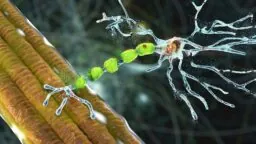 Cryptic Exons for Targeting Neurodegenerative Disease: Amyotrophic lateral sclerosis (ALS) only affects a fraction of cells and must be treated with high specificity. Scientists have achieved that by targeting mRNA sites associated with the disease.
Cryptic Exons for Targeting Neurodegenerative Disease: Amyotrophic lateral sclerosis (ALS) only affects a fraction of cells and must be treated with high specificity. Scientists have achieved that by targeting mRNA sites associated with the disease.
Astragalus Supplement Lengthens Telomeres in the Middle-Aged: Treating middle-aged people for six months with a supplement combination that included astragalus, a plant used in traditional Chinese medicine, positively impacted their telomeres.
 Exosomes Break Rat Lifespan Record: In Aging Cell, researchers have published their findings that exosomes, which we have previously reported to extend the lives of mice, also extend the lives of rats.
Exosomes Break Rat Lifespan Record: In Aging Cell, researchers have published their findings that exosomes, which we have previously reported to extend the lives of mice, also extend the lives of rats.
The Chemical Reasons Why Visceral Fat Is Dangerous: In Aging Cell, researchers have described the chemical ways in which excessive visceral fat, which is metabolically active, causes oxidative stress and cellular senescence.
 Heart Organoids Flown to Space Show Signs of Dysfunction: Scientists have found that human heart tissue is harmed by even a short stint in orbit. This might have implications for future space travel.
Heart Organoids Flown to Space Show Signs of Dysfunction: Scientists have found that human heart tissue is harmed by even a short stint in orbit. This might have implications for future space travel.
Blueberry Extract Aids Cognition in People With Inflammation: A reanalysis of data from a previous study identified a difference between people with low and high levels of inflammatory biomarkers. The cognitive performance of people with high levels of inflammation improved after they consumed anthocyanin supplements.
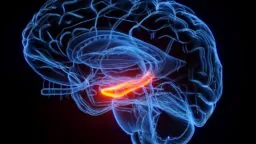 A Potential Target for Post-Surgery Cognitive Impairment: In Aging Cell, researchers have identified a receptor in the brain that appears to be responsible for cognitive problems after surgery, particularly in older people.
A Potential Target for Post-Surgery Cognitive Impairment: In Aging Cell, researchers have identified a receptor in the brain that appears to be responsible for cognitive problems after surgery, particularly in older people.
Scientists Create a Potent Bacterial Anti-Cancer Vaccine: A new study describes a novel anti-cancer vaccine based on antigen-producing bacteria that can tackle solid and metastatic cancers by colonizing tumors.
 The Reason Why the p16 Senescence Pathway Exists: Researchers publishing in Aging Cell have investigated the biology of skin cells taken from people who don’t produce the senescence-related compound p16. This condition leads to familial melanoma syndrome.
The Reason Why the p16 Senescence Pathway Exists: Researchers publishing in Aging Cell have investigated the biology of skin cells taken from people who don’t produce the senescence-related compound p16. This condition leads to familial melanoma syndrome.
Autodigestion From Gut Enzymes May Drive Aging: A new study links damage caused by digestive enzymes escaping from the gut to several hallmarks of aging. The researchers dubbed this effect “autodigestion.”
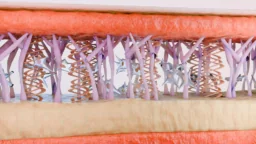 HAPLN1 in Blood Found to Rejuvenate Skin: Investigating the factors involved in skin rejuvenation processes, researchers have identified the role of hyaluronan and proteoglycan link protein 1 (HAPLN1) in restoring collagen and hyaluronic acid in aged skin.
HAPLN1 in Blood Found to Rejuvenate Skin: Investigating the factors involved in skin rejuvenation processes, researchers have identified the role of hyaluronan and proteoglycan link protein 1 (HAPLN1) in restoring collagen and hyaluronic acid in aged skin.
A Senolytic Treatment for Liver Sepsis: A paper published in Aging Cell offers evidence for the idea that senolytics, which remove senescent cells, might be a treatment for acute liver sepsis and not just age-related diseases.
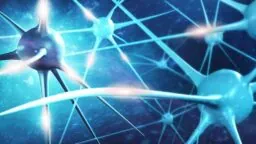 Neuronal Reprogramming Alleviates Alzheimer’s in Mice: Scientists have shown that long-term intermittent reprogramming limited to hippocampal neurons increases their fitness and improves cognitive function in a mouse model of Alzheimer’s disease.
Neuronal Reprogramming Alleviates Alzheimer’s in Mice: Scientists have shown that long-term intermittent reprogramming limited to hippocampal neurons increases their fitness and improves cognitive function in a mouse model of Alzheimer’s disease.
The Fibroblasts That Protect Ovarian Cancer: In Aging, researchers have described a subpopulation of fibroblasts that nurture ovarian cancer tumors and shield them from harm.
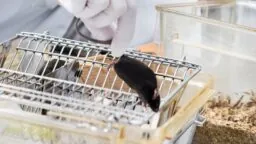 NOVOS Supplement: Lifespan Extension in Male Mice: A recent preprint study suggests that a NOVOS supplement can improve healthspan and extend lifespan in male mice.
NOVOS Supplement: Lifespan Extension in Male Mice: A recent preprint study suggests that a NOVOS supplement can improve healthspan and extend lifespan in male mice.
Senescent Cells Promote Cartilage Regeneration in Rats: In a rat experiment, researchers publishing in Aging Cell have found that senescent cells and SASP factors are key in regenerating knee cartilage.
Tree-based analysis of longevity predictors and their ten-year changes: a 35-Year mortality follow-up: The simultaneous examination of a broad range of potential predictors revealed that longevity can be achieved under very different conditions and is achieved by heterogeneous groups of people.
Dietary restriction impacts health and lifespan of genetically diverse mice: These findings indicate that improving health and extending lifespan are not synonymous and raise questions about which end points are the most relevant for evaluating aging interventions.
Dietary diversity contributes to delay biological aging: Dietary diversity is associated with a slower rate of biological aging, which may be due in part to reduced oxidative stress.
Association between prescription drugs and all-cause mortality risk in the UK population: As expected, most drugs were linked to a shorter lifespan, likely due to the life-limiting nature of the diseases they are prescribed to treat.
Hippocampal rejuvenation by a single intracerebral injection of one-carbon metabolites in C57BL6 old wild-type mice: The researchers propose the use of these metabolites to explore new strategies for the development of potential treatments for age-related brain diseases.
ESC-sEVs alleviate non-early-stage osteoarthritis progression by rejuvenating senescent chondrocytes: Collectively, these findings reveal that ESC-sEVs-based therapy is of high translational value in non-early-stage OA treatment.
Association of Muscle Strength With All-Cause Mortality in the Oldest Old: Prospective Cohort Study From 28 Countries: Rather than a specific threshold, muscle strength is gradually and inversely associated with mortality risk in the oldest old.
Ageing-associated long non-coding RNA extends lifespan and reduces translation in non-dividing cells: Although aal1 is not conserved, its effect in flies suggests that animals feature related mechanisms that modulate ageing, based on the conserved translational machinery.
Mifepristone and rapamycin have non-additive benefits for life span in mated female Drosophila: he data suggest that mifepristone and rapamycin act through a common pathway to increase mated female Drosophila lifespan.
Machine-guided design of cell-type-targeting cis-regulatory elements: Synthetic sequences exhibit distinct motif vocabulary associated with activity in the on-target cell type and a simultaneous reduction in the activity of off-target cells.
The senolytic drug ABT-263 accelerates ovarian aging in older female mice: Senolytic drugs given to reproductively old females may adversely affect fertility.
Senescent cell transplantation into the skin induces age-related peripheral dysfunction and cognitive decline: The accumulation of senescent cells in the skin can exert remote effects on other organs, including the brain.
Multi-omics evaluation of clinical-grade human umbilical cord-derived mesenchymal stem cells: The administration of HUCMSCs in SAMP8 mice not only reduces DNA damage but also induces favorable changes in gut microbiota and metabolism.
News Nuggets
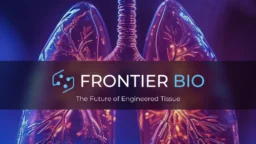 Lab-Grown Lung Tissue for Diseases and Transplants: Frontier Bio Corporation has announced a groundbreaking achievement in lab-grown lung tissue. By combining 3D bioprinting with the ability of stem cells to self-assemble, mimicking natural organ development, the California-based biotech company has created complex microscale lung tissue.
Lab-Grown Lung Tissue for Diseases and Transplants: Frontier Bio Corporation has announced a groundbreaking achievement in lab-grown lung tissue. By combining 3D bioprinting with the ability of stem cells to self-assemble, mimicking natural organ development, the California-based biotech company has created complex microscale lung tissue.
Solve Aging and Enhance Brains at MIT: It might take a second renaissance bringing polymaths across science to solve aging and enhance human mental capacity to groundbreaking heights. From 10/25 to 10/27, Ekkolápto, Augmentation Lab, and Meditation Artifacts united interdisciplinary minds.
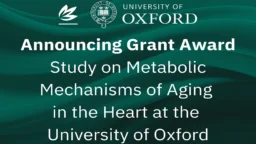 Grant Awarded for Heart Aging at the University of Oxford: The Longevity Science Foundation (LSF), a nonprofit organization dedicated to funding research aimed at extending the healthy human lifespan, is proud to announce a grant award to researchers at the University of Oxford’s Department of Physiology, Anatomy, and Genetics.
Grant Awarded for Heart Aging at the University of Oxford: The Longevity Science Foundation (LSF), a nonprofit organization dedicated to funding research aimed at extending the healthy human lifespan, is proud to announce a grant award to researchers at the University of Oxford’s Department of Physiology, Anatomy, and Genetics.
World’s First Subzero Organ Transports: In a world first, a pig kidney preserved at subzero temperatures was successfully transported across the Atlantic Ocean multiple times, demonstrating the potential for a novel technology to greatly extend organ storage and preservation, and make long-distance organ transportation a clinical reality.
Coming Up
 Longevity Summit Dublin 2025 Announces New Dates and Venue: Longevity Summit Dublin, the premier international event dedicated to the latest research, innovation, and collaboration in the field of longevity, is excited to announce its new dates and venue for 2025.
Longevity Summit Dublin 2025 Announces New Dates and Venue: Longevity Summit Dublin, the premier international event dedicated to the latest research, innovation, and collaboration in the field of longevity, is excited to announce its new dates and venue for 2025.








